Auto detailing can be highly profitable with a low barrier to entry and equally low overhead costs. We’ll show you how to start a car detailing business.
Let us demonstrate how owning a car detailing business isn’t complicated or expensive.
We gathered expert advice from GoDetail founder and owner Alan Tursunbaev. He started the auto detailing business for extra money between high school and college. At 22, he’s making $75K per month. Even better, he’s increased revenue by 50% in the last six months. Best of all, he offers $10 discounts for every referral a customer sends.
We’ll explain the step-by-step process of how to start a car detailing business. By the end of this article, you’ll understand more about:
- Car detailing business skills
- Mobile detailing services
- Car detailing business plans
- Cleaning business names
- Business structure and other legal requirements
- Cleaning business finances
- Safety during business operations
- Equipment for mobile detailing businesses
- Mobile car detailer marketing
- Employee management structure
- Processing documentation
Are you ready to start a successful car detailing business?
Step 1. Learn more about the car detailing business
There are three areas you should understand before starting a car detailing business:
- Car detailing industry
- Detailing technical skills
- Soft skills
Learn about the mobile detailing industry
Someone starting a car detailing company needs to understand the $14.7 billion car wash and auto detailing industry. We’ll answer some common questions about how to start a mobile detailing business.
How much do car detailers make?
According to IBISWorld Report 81119A, there are over 67,000 companies under NAICS Code 811192. That means the average company makes around $220,000, but it varies dramatically.
GoDetail makes approximately $900K per year, making it over four times the revenue of the average company.
How much does a car detailing business owner make?
The net income for the industry is 17.1% of revenue, which means that the average small business owner makes approximately $37,620 in profit plus any salary they take from mobile car cleaning. But, Alan told us:
Check out our first interview with Alan below:
How much does it cost to start detailing business operations?
Alan started his mobile car detailing business with $500. So you don’t need much money when starting a mobile detail business. If you are starting a detail business with a physical location, it may cost $20,000 to $10 million, depending on the cost of land, equipment, and labor in your area.
Now, just because you can start this business with $500 doesn’t mean that’s the best choice. A larger investment at the start can often help you grow faster so you’ll end up with more money in the long term. This doesn’t need to mean taking out a massive loan, either. A business line of credit gives you access to funds when you need them and you’ll only accrue interest on the money you use, making it a flexible and cost-saving way to get a quick cash infusion for a new detailing business.
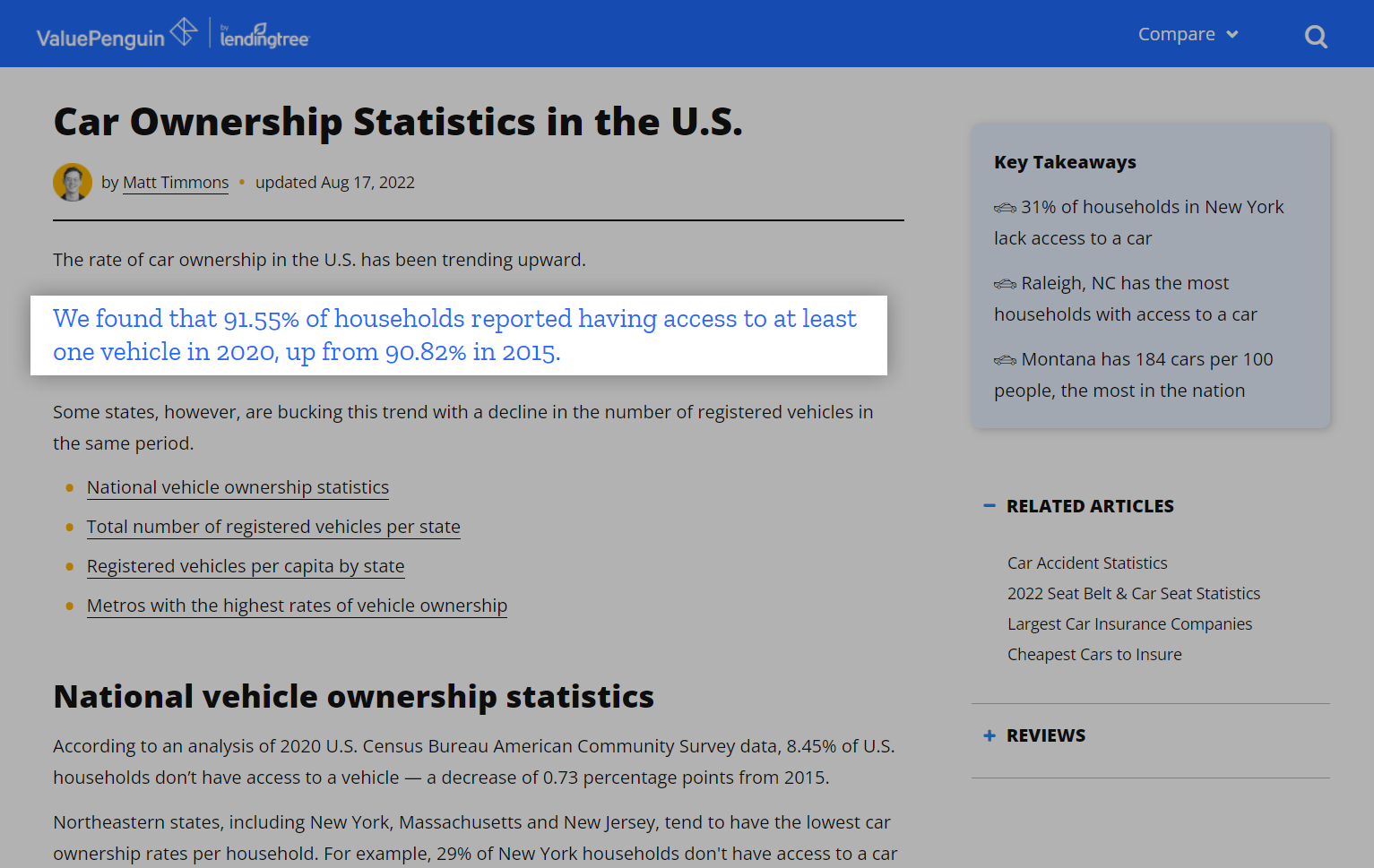
The good news is that starting an auto detailing business doesn’t require a ton of experience. Over 90% of US households have access to at least one vehicle. So, services catering to automobile owners aren’t going anywhere!
Let’s get into the “details” about starting a car detailing service.
Skills for a mobile car detailing business
So what are the skills you’ll need? You’ll need to be able to do the following when starting a detailing business:
- Air compressor operation
- Car washing and drying by hand
- Leather conditioning
- Polishing
- Pressure washing
- Upholstery cleaning
- Wet and dry vacuuming
Learn and practice these skills, and you’re on your way to becoming a successful auto detailer!
IMPORTANT: If you want an in-depth tutorial on how to start a detailing business, check out Alan’s course. He’ll walk you through setting up everything you need for a new business, including the automations and marketing to get more customers and save money. Use coupon code “UpFlip” to get 25% off.
Alternatively, you can watch YouTube auto detailing videos or read Detailing 101. Simple, right?
Auto detailing certification
Automotive detailing doesn’t have as many certifications as other cleaning businesses do. Here are a few you might consider when you start a detailing business:
International Detailing Association (IDA)
The IDA offers four levels of certification. With each one, you get uniform badges, branding materials, and a listing on the IDA website. Check out their certifications:
- Certified Detailer (Phase 1): 10 tests you can take online that cost $400 for nonmembers (NM) or $200 when you buy a $110 per year membership.
- Skills Validated Detailer (Phase 2): Same pricing as Phase 1 but requires four mobile detailing skills tests.
- Recognized Independent Trainer: Requires active membership, Phase 2 certification, three years of training experience, references, and an outline of the training to be considered.
- Marine Certification: If you want to be a mobile detailer who works on boats, you’ll have to take the Phase 1 exam, then take the $400 NM or $200 member five-part certification exam.
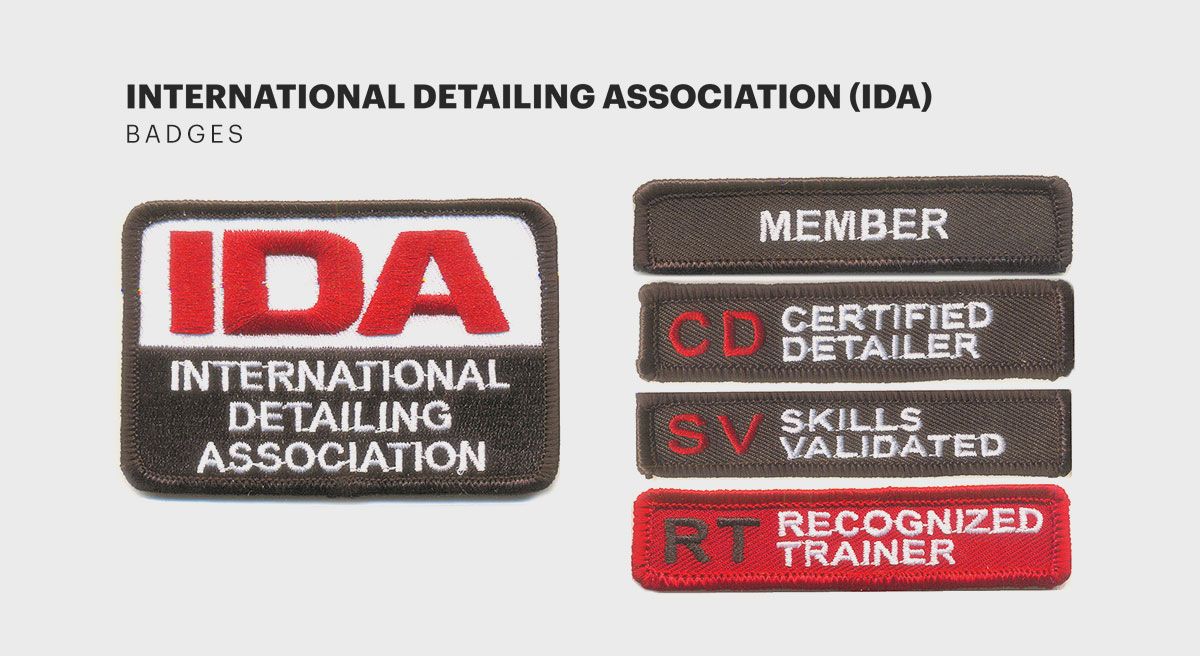
Detail King
Starting a car detailing business is easier with Detail King. You might want to consider Detail King because they are:
- A Pennsylvania accredited technical school for detailers.
- A supply house for everything mobile auto detailing related (You’ll get discounts on cleaning business startup kits and supplies.)
- Paint restoration trainers, which means you’ll have a chance to expand revenue streams.
- Ceramic coating trainers, which helps mobile detailing businesses offer a service that starts at $1,000, and improves resale value by documenting it on Carfax. Ceramics protect against scratches, small dings, and corrosion.
- Offering licenses which are the equivalent of a franchise without the franchise fees.
Not-so-technical skills
The key to Alan’s success is incredible customer service and looking at the big picture. He adds value to his mobile detailing service by:
- being personable
- learning names
- sharing detailing tricks with customers
The common denominator of successful businesses, especially startups, is excellent customer service.
Don’t neglect these soft skills:
- communication
- empathy
- patience
- trustworthiness
Alan told us:
He added that you need to hire employees, automate, and create scripts to build this into your mobile detailing business model and grow.
The International Detailing Association (IDA) published a code of ethics you might want to check out.
Here’s the formula

The formula for gaining skills and experience for starting a car wash business is:
- Learn technical skills.
- Pay close attention while detailing cars.
- Nurture those soft skills.
There are even more mobile auto detail tips available on Detail University!
It’s that simple. Now shake that up and spray it over any areas of doubt you had about how to start a detail business.
Step 2. What type of detailing business is right for you?
GoDetail provides both home auto detailing and commercial fleet detailing services, but there are many types of detailing businesses. For example, your small business can concentrate on:
- at-home car detailing
- boats
- commercial fleet inventories, such as a car dealership
- recreational vehicles (RVs)
- shop, garage, or car wash-based operation
Stationary or mobile?
Alan and his crew have both mobile and stationary car detailing. Mobile sounds convenient, right? Keep reading to decide what works for you.
Car Wash
Stationary car detailing businesses need a garage, lobby, office, adequate plumbing, parking lot, and other infrastructure. It’s easy to realize that this is the more expensive option. Nevertheless, it can be very profitable. Read more about costs and garage setup when starting a car detail business.
Two types of stationary detailing shops

There are generally two types: high-volume and boutique.
How to start a car detail business with high volume
A high-volume business location serves customers looking for lower-cost services. These small businesses offer:
- convenience
- fast service
- high volume (of course)
- more workers with fewer skills
- low prices
- A mix of automation, self-serve, and manual service
People might vacuum their own car at these. Some local businesses even require the owner to hand wash the car.
Most businesses that require a customer to wash their own car have gone out of business. If you find one, you might want to buy it because you can add automation without needing to pay for as many construction costs.
Starting detailing business: Boutique
Alternatively, boutiques attract customers with luxury vehicles who appreciate first-class treatment and advanced services, such as paint corrections. A boutique detailer provides:
- high prices
- low volume
- services for high-end vehicles
- small, well-trained staff
- specialized services, including ceramic coatings
Don’t assume less work and more money is always better. If your personality isn’t refined, a boutique may not be right for you. Maybe you want to do something else involving motor vehicles like:
In essence, consider your options and make the best choice for you.
How to start mobile detailing business
Mobile detailing is better for many small business owners because it requires less capital and experience.
Notto Jensen, the owner of Attention 2 Detail attributes much of his success to this decision:
Starting small and being mobile…turned out to be an asset.
Here’s the magic: All you need is a van and some supplies. Alan estimates startup costs for supplies are around $500. You can get a used van with under 100K miles for $10K to $20K.
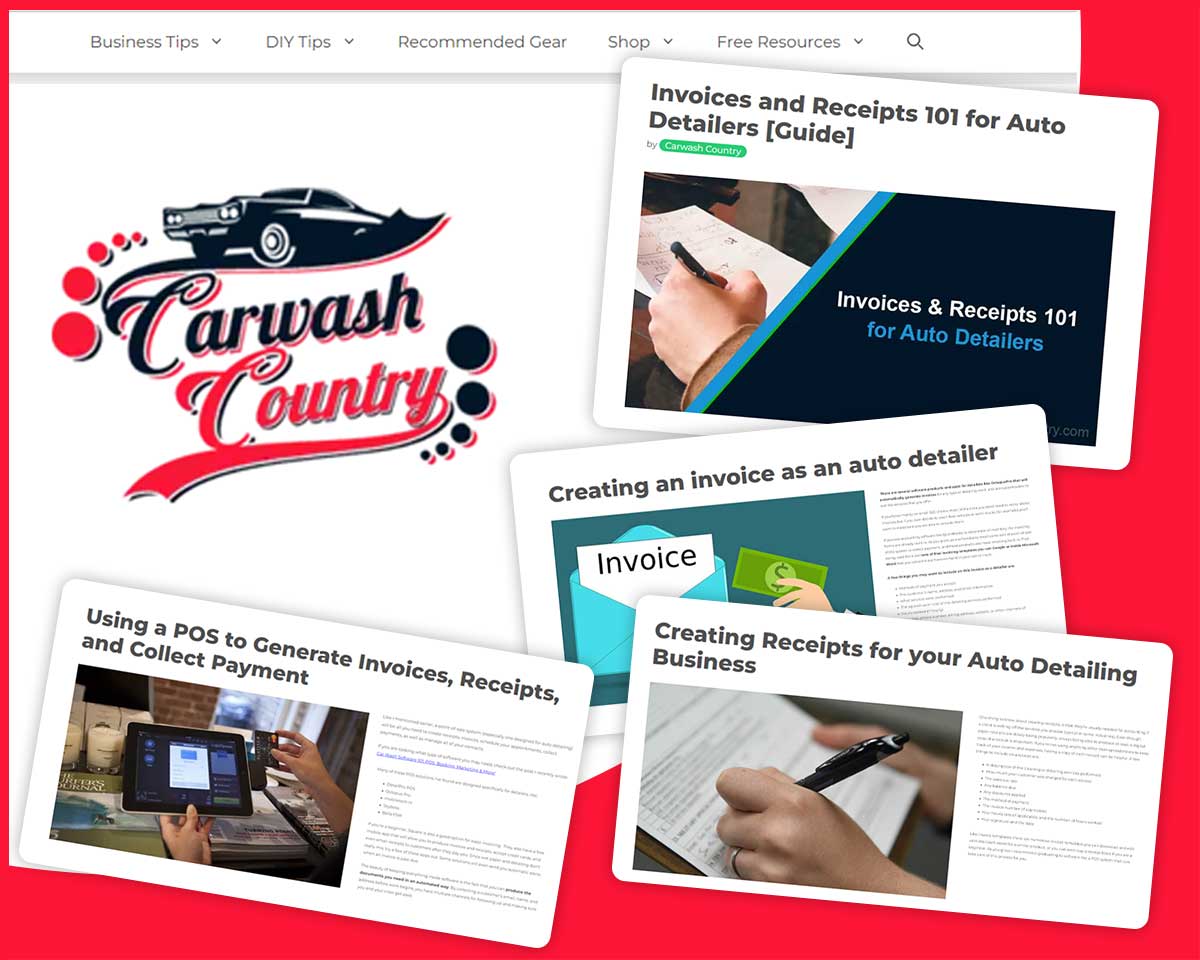
Take the next step by researching how to accept payments. Start by reading this: “Invoices & Receipts 101 for Auto Detailers.” There’s good stuff there.
The competitive advantage of a mobile car wash business
Notto realized that starting small, being mobile, and not being able to afford overhead initially benefited him. He says:
We also interviewed Isaiah Barhoum of Big’s Mobile Detailing.
There’s plenty of business ideas you can consider. Check out our courses here.
Step 3. Write a car detailing business plan
I know what you’re thinking: I can learn how to start a car detailing business from home and watch the profits shine. Well, there’s more to it than that. The deal is that a car wash business plan is your roadmap to long-term success.
Business plan sections are pretty standard. Make sure to include:
- auto detailing insurance
- competitive analysis of car detailing in my area
- detailing supplies
- financial projections
- ideal physical location
- licenses and permits
- marketing plan
- strategies to make money
And the best part is that UpFlip’s guide steers you through writing a business plan, including a free template to download. It’s worth your time to check it out.
Step 4. Choose a name
Now, it’s time for some fun!
Choosing a name is an exciting part of the entrepreneurial process. Enjoy being creative, but consider the following points:
- Add your details: You want people to know what you do, but don’t constrain yourself too much. GoDetail and Attention 2 Detail both state what they do, but Attention 2 Detail can be expanded to any niche.
- Easy and clear: Potential customers may be put off by a name they struggle to spell or pronounce. Keep it simple.
- Location: Consider including your location to attract customers in your area and establish yourself within the local region.
- Branding: Ask yourself if you can easily incorporate your name into branding elements, such as logos and graphics. For inspiration, read the histories behind famous car logos.

Set up a dot com
Using a dot com in your website address looks very official. Run your name through this domain name search to see what’s available. Also, it’s worth your time to read UpFlip’s guide on creating a website.
Lock it all in
Run your business name by some trusted friends and family (and Google Trends) and then register it legally, which brings us to our next step below.
Step 5. How to start a car detailing business
Establishing a legal structure is vital and legally necessary, and it might require professional help. The experts at CorpNet understand all the ins and outs of what it takes to set up and run a business legally. They can also be helpful down the line with things like payroll tax registration and other legal matters that will come up as you grow. If you’re just looking for more information, check out their Learning Center for comparisons of different legal structures and other helpful knowledge.
Your new detailing business will likely need assorted licenses, permits, and tax forms. Find out what you’ll need from the Small Business Administration (SBA) and Municode Library.
The Municode Library is great, but most of us aren’t lawyers. Fortunately, I went through and gathered the information for cleaning businesses and most of it will apply to mobile detailing.
Business structure & car detailing license
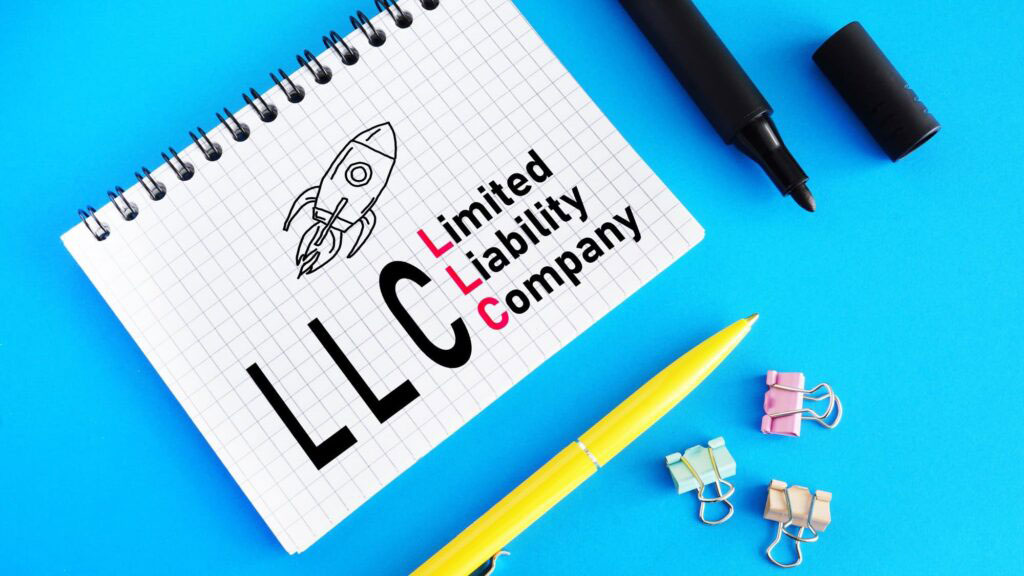
There are several types of business structures you may want to use. You can file for most of them on the Secretary of State website for your state.
- S-Corporation: Best for high earning companies that want to lower business owner taxes. Limited number of stockholders, provides personal liability protection, requires business owners to receive salary (and optional dividends), no double taxation.
- C-Corporation: Best for companies trying to change the world. Unlimited stockholders, provides personal liability protection, high compliance costs, and double taxation. Business owners can earn money through multiple income streams with different tax codes.
- Limited Liability Company: Best for companies that want to separate business entities from personal assets. Provides limited liability, pass-through income, and no double taxation.
- Sole Proprietorship: Best to just get started. Doesn’t provide liability protection or create a separate business entity, and is considered personal income. Don’t use a sole proprietorship if you hire employees.
To learn more about business structures, check out our blog on 11 structures. You’ll also want to get your business licensed. Some states let you do it all at once. Don’t forget to grab an employer identification number from the IRS. It’s like a social security number for your business.
Open a business bank account

To run a successful business, you need to open a business bank account because you need to separate your business and personal finances. Business bank accounts can be either online or from banks and credit unions.
Online banks tend to have better offers, but they might not offer the range of business credit card accounts you can open in the legacy banking system. If credit accounts or making cash deposits are important to you, go with the legacy banks. Learn more.
Get business insurance
You’ll want to get business insurance including:
- General liability insurance
- Property damage insurance
- Workers compensation insurance
- Cyber Security Insurance (You have people’s credit cards, names, and addresses.)
Consider Simply Business to get the most competitive insurance quotes for your business.
Step 6. Set up your car detailing business finances
Let’s talk numbers. You already have a budget from your business plan and know what the industry profit margin is. How are you going to fund the business?
Funding

The auto detailing industry’s barrier to entry is low, but funding is an important step. Try business financing through one of our partners. Other sources provide a boost, such as:
- angel investor
- business partner(s)
- credit cards
- crowdfunding
- government programs
- home equity loan
- friends or family
- personal finance through savings or wages
- rollover for business startups (ROBS)
Each method has its pros and cons. For example, personal funds help you possess full ownership and avoid interest, but they might place you in a risky position financially.
Pricing structure
Rather than charging per hour, Alan set prices for car detailing based on the size of the car. Make sure to have a price list for common cars. Notto charges per foot for boat detailing. Customers appreciate transparency.
Charge extra on the initial detailing or when the vehicle has extra grime. Explain to customers that a routine detail will cost less per cleaning because it keeps the car cleaner.
Once you have a price locked in for a customer, put it in writing. If needed, create a contract with crystal clear terms. It makes sense, right?
Revenue and profit
Alan says:
He has 18 employees, bringing in revenue of around $75,000 per month. For more information on how to profit from detailing services, take Detail King’s advice for a spin.
Step 7. Establish safety protocols
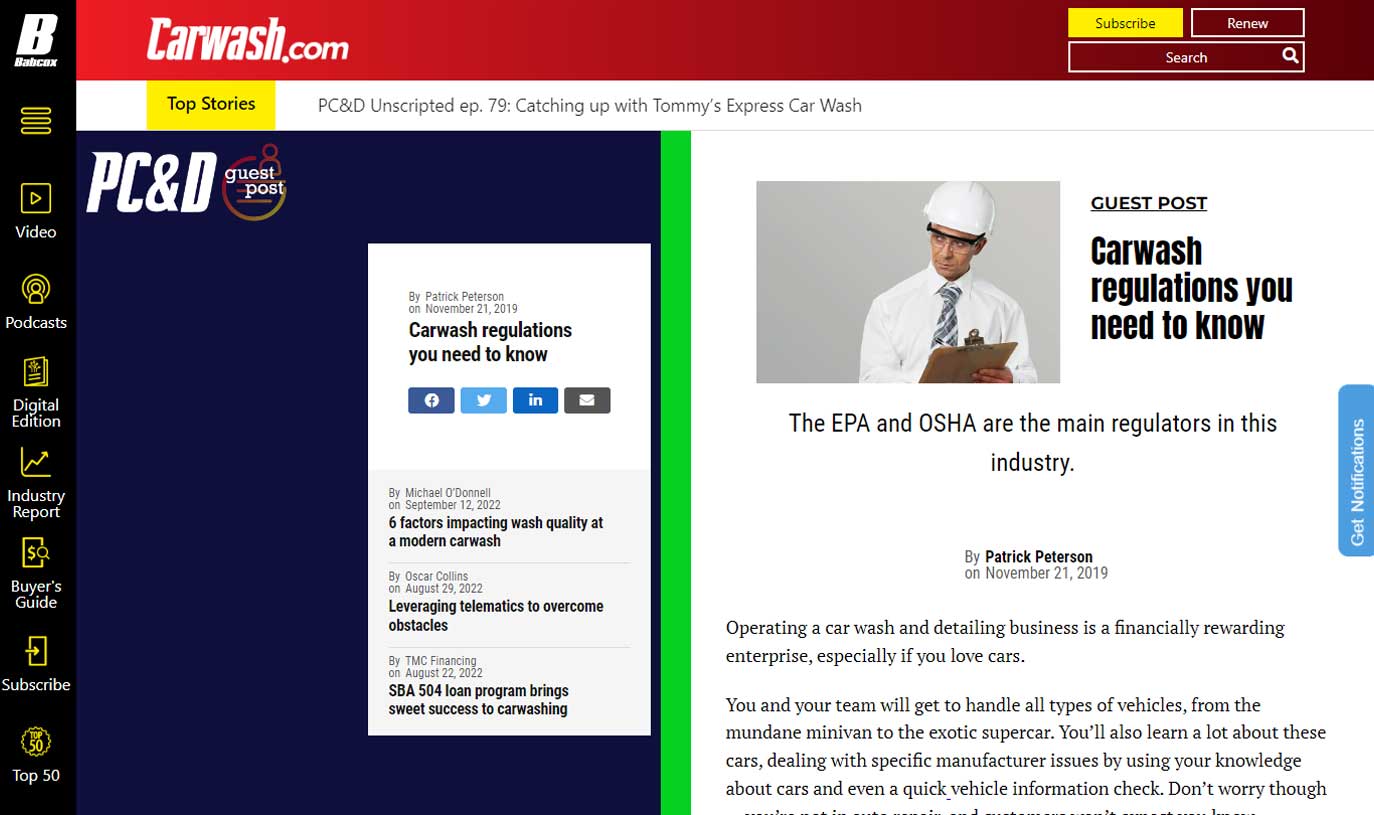
Training and adhering to safety guidelines, such as the Occupational Safety and Health Administration (OSHA) guidelines, are essential in this business. Take them seriously to keep all parties safe from injury, fines, and legal action.
Know your stuff
Be familiar with detailing chemicals and equipment operations, and investigate locations before performing a mobile detail. Here’s the truth: good practices mitigate risk and prevent fines over violations.
Environmental concerns
Both mobile and brick-and-mortar detailers must be mindful of issues and regulations about the environment, like the Clean Water Act and Ozone Transport Commission (OTC).
IDA explains environmental concerns on their website. Also, you can offer eco-friendly products for your service.
Step 8. Get equipment and supplies
Equipment and supplies for a detailing business vary for mobile or stationary, with items in common. Let’s open the door and hop in.
Common supplies
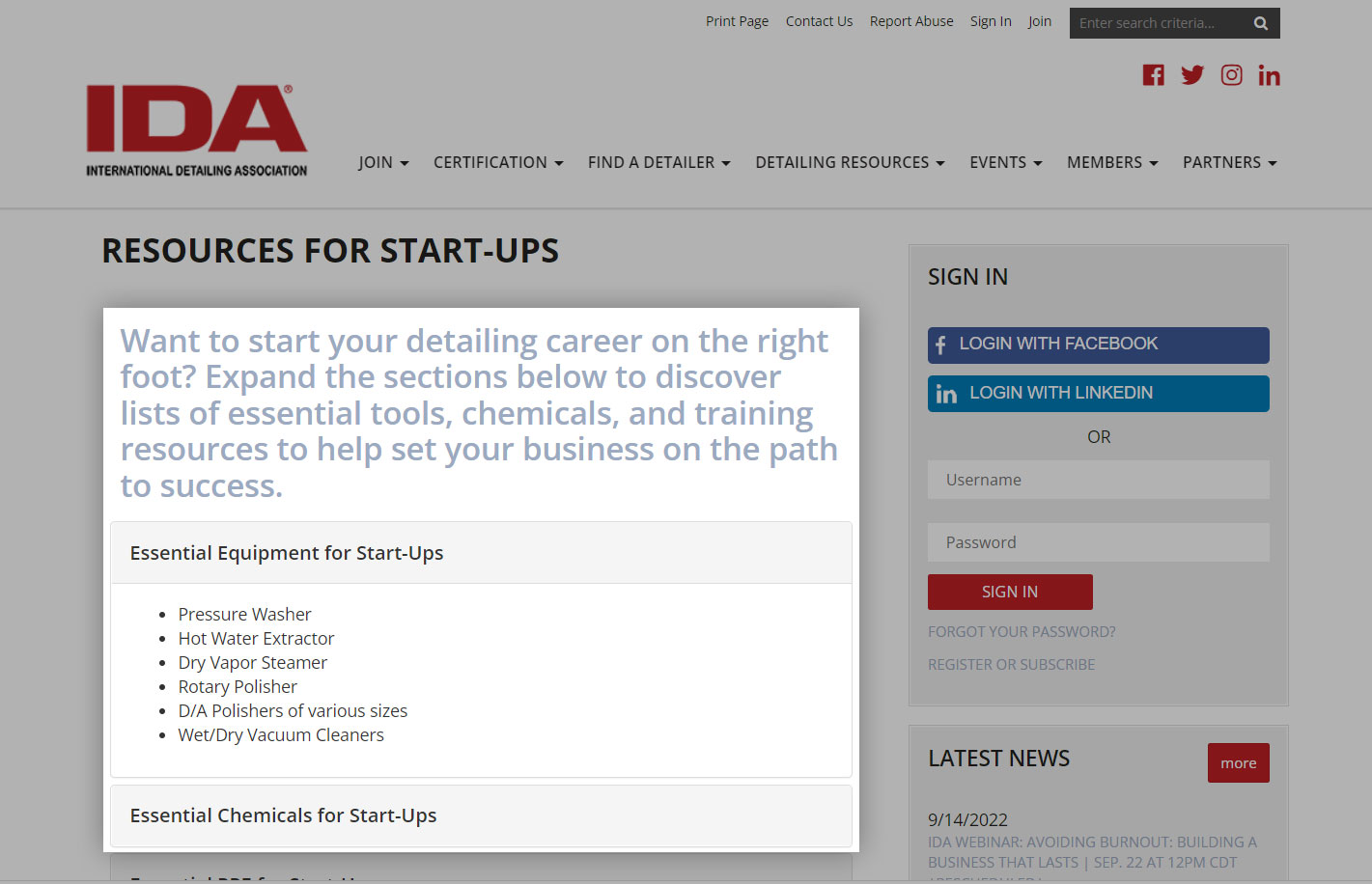
Car detailing businesses need the same essential items, such as brushes, polishers, and a vacuum. Learn more by reading IDA’s list of essential equipment for detailers. It’s worth your time to check it out. You’ll also need to get some software to run your business.
Software for Mobile Detailing
A solid CRM software is a must for any mobile business, ensuring your employee and customer communications are organized and that no tasks are falling through the cracks. Hubspot is our favorite at UpFlip because it integrates your sales pipeline and lead management into your customer engagement portal so everything’s in one convenient place.
You might also want to check out Service Titan because it is specifically built with service businesses in mind.
Don’t buff out the importance of a polisher
As Notto puts it, your “main muscle” is your buffer, which you can purchase easily from retailers. There’s also a ton of options for wax. Notto suggests finding two or three that work for you. There’s no need to buy them all.
Water reclamation
Some detailers collect and dispose of greywater with a water reclamation system. Detail King offers guidance, but that’s only part of the story because certain states regulate greywater. So, be sure you comply with applicable laws.
Alan prefers to use Optimum No Rinse (ONR) because it reduces the water needed down to a bucket. Requires one ounce of ONR and two gallons of water per car.
It’s All in the Details with the UpFlip Academy |
|
| We spent months creating step-by-step programs for your business launch with real entrepreneurs who are now making millions—all in the UpFlip Academy. Whether it’s car detailing or another business opportunity you have your eye on, there’s so much to learn from people like Brandon Vaughn, who runs 12 multi-million-dollar businesses. Get access to his secrets and advice from countless other entrepreneurs. | |
| Sign up now! | |
Costs
At the time of writing this article, costs for important detailing equipment you’ll need are as follows:
- Absorber (Notto’s favorite towel) $20 for two
- All-purpose cleaner $7
- Buffer $120
- Hoses and nozzles $75 to $100
- Leather cleaner and shoe brush $15
- Pressure washer $159 (You don’t need this if you’re using ONR)
- Shop-Vac $100
- Small tools, such as grout brushes $13
- Business cards $30
Back it up
Imagine running out of drying towels at a customer’s house. Instead of watching water droplets form white spots on the great wash you just performed, plan with backup supplies and equipment.
Acquire what you can at first, but heed Notto’s advice that not having them can “stop you dead in your tracks.” Don’t let this be you.
Mobile detailing business

A mobile detailing setup requires a heavy-duty vehicle, such as a van, SUV, or trailer. Be sure it’s reliable, presentable, and has plenty of space for supplies and equipment. Notto stresses vehicle reliability as the key to success.
Are you wondering where the water comes from to wash all these vehicles?
Some mobile car detailing businesses utilize the customer’s residential water supply, while other mobile car wash businesses have a water tank. There are also “waterless” detailing supplies like ONR.
Step 9. Hire employees
Alan had a lot to say about hiring employees. He’s hired 18 of them and told us:
He went on to explain:
Alan emphasized the importance of paying them well and commission.
Once you get busy enough, Alan recommends hiring employees, then a receptionist, and finally a manager. He cautioned people against one of the biggest mistakes when hiring:
Watch our interview with him below.
According to Notto:
Some of the qualities of a good employee include:
- dependable
- enthusiastic
- on time
- positive
- safety-conscious
- team player
It also helps if they possess technical skills, which can be taught. Also, here’s a great new hire checklist for a car detailing business.
Step 10. Develop a sales and marketing strategy

Marketing is super important, and sales bring in revenue. So, don’t skimp on your sales and marketing budget.
Alan told us:
His marketing budget is $3,500, and it’s divided evenly between:
- Google Ads
- Print materials
- Business cards
According to Carfax.com, an excellent selling point is that a regularly cleaned car increases its resale value and promotes pride in ownership. Keep reading to learn more about your sales audience.
Market Research: Identify your customer
Create an ideal customer persona to help you pinpoint your ideal demographic. Narrowing down the characteristics of your ideal customer will help you build your customer base.
Read more about identifying ideal customers and creating a customer persona.
Do some research to figure out who is willing to pay for the services you provide in your area. Once you’ve narrowed it down, go out and find some customers!
Digital marketing

In the digital age, your online presence is how customers find you. A website, social media accounts, email newsletters, and digital advertising are all practical marketing tools. Check out Upflip’s helpful guide on creating a website.
Search engine optimization (SEO)
Alan says:
Be sure to implement SEO for the best results. Services like Surfer can help you with that. And the best part is you can always perform a quick test to determine if your SEO is working.
Check out what Entrepreneur.com has to say about finding a reputable SEO company. And once you have your website, don’t forget to explore the following opportunities to improve SEO:
- featured snippets
- Google Business Profile
- blogs
- backlinks
- optimization of your site for speed
Digital business card
Try a digital business card service, like Popl, that allows you to link your contacts, websites, social pages, payment apps, and promotional material all from one page.
Social media

Instead of spending too much time scrolling through social media, make it work for your business! Facebook and Instagram provide free insights on business accounts, with opportunities to run paid ads.
Managing multiple social media platforms can take a lot of time, and that’s something most small business owners don’t have to spare. Tailwind makes this easier by managing your email and social media marketing across platforms, and is an especially useful tool for small detailing businesses that don’t have the budget for dedicated marketing staff.
Email newsletter
A newsletter is an excellent way to keep in touch with customers and send them coupons. Mailchimp and Constant Contact provide awesome email marketing tools.
Digital advertising
Take your ad dollars one step further with broader digital marketing efforts. Consider pay-per-click (PPC), marketing automation, and other avenues.
Printed materials
Alan told us:
Consider creating mailers, brochures, business cards, car magnets, flyers, t-shirts, and other promotional swag as a way of getting your name out there. Use an application like Canva to help. Alan told us about his car detailing business cards:
Direct contact
Cold-calling and door-to-door advertising are less common these days than they were when Notto started in the mid-nineties, but these methods can still be effective if done responsibly.
Polished appearance

Like the vehicles you clean, everything about your appearance should sparkle. Be a rolling advertisement by ensuring your crew, equipment, and fleet vehicles look polished.
Consider simple uniforms and vehicle branding to look professional and maximize advertising.
Get reviews to feed the crews
Don’t forget reviews! They’re a cost-effective way to appeal to customers online. Excellent service with a friendly approach will result in good reviews.
Alan says:
In addition, actively seek reviews! Alan uses Housecall Pro to have reviews automatically sent to his customer base. However, he’s building his own CRM that will fix some of their problems and cost each car detailing business about half as much.
Otherwise, only negative reviews will prevail. For bad reviews (warranted or not), respond professionally.
Good feedback leads to new customers and encourages repeat business. It’s a car detailing shop, so you know customers will need recurring service. Simple, right?
Step 11. Document business processes

Establish good processes that scale easily and that others can follow. You won’t let go of the wheel completely, but it will help you smooth bumps in the road. Use Lucidchart to document them in a process map.
Here’s a basic “process” for working through your options:
- Set a goal for your process mapping session.
- Include all roles involved in the workflow.
- Identify the issue you hope to solve with the map.
- List all activities.
- Determine the triggers, inputs, and outputs.
- Flow out the steps and decisions because you can’t always depend on the “ideal” path.
- Make the final draft, get all roles to agree, and sign off on the process map.
Create a successful car detailing business
The internet won’t replace the service industry. Making cars clean and shiny isn’t going anywhere soon. Before starting your auto detailing business, ask yourself two fundamental questions:
- What do I need to research?
- Am I capable of providing a great experience through top-level customer service?
It might seem like a lot, but don’t overcomplicate it. In truth, you can start a car detailing business quickly.
Have the vision to provide outstanding service, have fun, make money, and make people happy. That’s all you need to succeed. Now buckle in and drive through the wash bay to come out as a clean, mean detailing machine.
Take the next step in learning more about vehicles—and potential customers—by reading about car rental and charter boat businesses.
What are some of the best strategies you have found to improve your business results?




